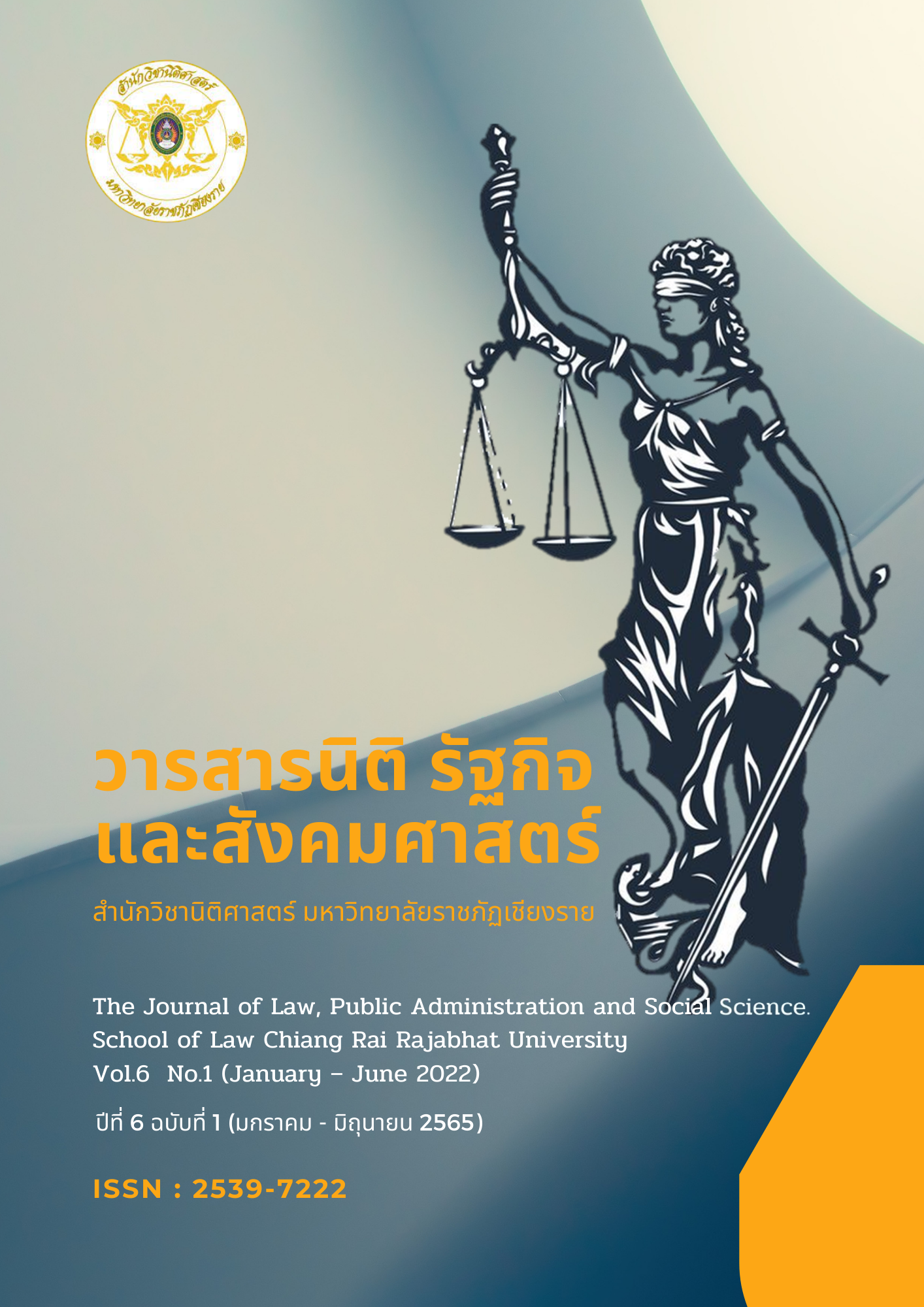ชัยชนะของปรัชญากฎหมายปฏิฐานนิยมต่อการจัดทำรัฐธรรมนูญแห่งราชอาณาจักรไทย พุทธศักราช 2560
Main Article Content
บทคัดย่อ
หลังจากการเปลี่ยนแปลงการปกครอง ในปี พ.ศ. 2475 พบว่า มีปรัชญากฎหมายธรรมชาติ ปรัชญากฎหมายปฏิฐานนิยม และปรัชญากฎหมายประวัติศาสตร์แนวคิดปรัชญากฎหมายตะวันตกที่มีอิทธิพลต่อการช่วงชิงปลูกฝังคนในสังคมไทยผ่านทางระบบกฎหมายที่เป็นเครื่องมือของรัฐควบคุมคมโดยเฉพาะการจัดทำรัฐธรรมนูญไทย
ผลสรุปปัจจุบันภายใต้รัฐธรรมนูญแห่งราชอาณาจักรไทย พุทธศักราช 2560 นับว่าเป็นความตกต่ำของสำนักกฎหมายธรรมชาติที่มีต่อปฏิฐานนิยมทางกฎหมาย โดยการค้ำยันของสำนักกฎหมายประวัติศาสตร์และขับเคลื่อนโดยแนวคิดนิติศาสตร์เชิงสังคมวิทยาออกมาเป็นกฎหมายที่เป็นเครื่องมือของรัฐควบคุมคนในสังคม อยู่ 4 ประการ ดังนี้ ประการที่ 1 การค้ำยันในตัวบทบัญญัติรัฐธรรมนูญรับรองการรัฐประหารชอบด้วยรัฐธรรมนูญภายใต้แนวคิดปฏิฐานนิยมของจอห์น ออสติน ประการที่ 2 การค้ำยันของคำพิพากษาของศาลและคำวินิจฉัยของตุลาการรับรองการรัฐประหารชอบด้วยกฎหมาย ประการที่ 3 การค้ำยันด้วยแนวคิดกฎหมายสำนักกฎหมายประวัติศาสตร์ในเรื่องจารีตประเพณีการปกครองในระบอบประชาธิปไตยอันมีพระมหากษัตริย์ทรงเป็นประมุข และประการที่ 4 ภายใต้อิทธิพลปฏิฐานนิยมที่มีนิติศาสตร์ เชิงสังคมวิทยาเป็นตัวขับเคลื่อนออกมาเป็นกฎหมายที่เป็นเครื่องมือของรัฐควบคุมคนในสังคมในการปฏิรูปประเทศไทย
Article Details
เอกสารอ้างอิง
จรัญ โฆษณานันท์. นิติปรัชญา: นิติศาสตร์เชิงสังคมวิทยา. กรุงเทพฯ: มหาวิทยาลัยรามคำแหง, 2552.
จรัญ โฆษณานันท์. สิทธิมนุษยชนไร้พรมแดน. พิมพ์ครั้งที่ 2. กรุงเทพฯ: สำนักพิมพ์นิติธรรม, 2554.
จรัญ โฆษณานันท์. นิติปรัชญา. พิมพ์ครั้งที่ 20. กรุงเทพฯ: มหาวิทยาลัยรามคำแหง, 2558.
จรัญ โฆษณานันท์. นิติปรัชญาภาคสองปรัชญากฎหมายไทย. พิมพ์ครั้งที่ 6. กรุงเทพฯ: มหาวิทยาลัยรามคำแหง, 2545.
บวรศักดิ์ อุวรรณโณ. “พระราชอำนาจ พระมหากษัตริย์ไทยไม่เหมือนใครแต่ไม่ทั้งโลก.” เดลินิวส์, 29 กันยายน 2554, 2.
รองพล เจริญพันธุ์. นิติปรัชญา. กรุงเทพฯ: มหาวิทยาลัยธรรมศาสตร์, มปป.
วรเจตน์ ภาคีรัตน์. “การปฏิวัติสยาม 2475 (ชั่วคราว) ? พระราชอำนาจของพระมหากษัตริย์และอำนาจตุลาการหลังการเปลี่ยนแปลงการปกครอง.” วารสารฟ้าเดียวกัน 8, ฉ.2 (ตุลาคม-ธันวาคม 2553): 70.
วรเจตน์ ภาคีรัตน์. ประวัติศาสตร์ความคิดนิติปรัชญา. กรุงเทพฯ: อ่านกฎหมาย, 2561.
สิทธิกร ศักดิ์แสง และอภิรดี กิตติสิทโธ. “แนวคิดว่าด้วยกฎหมายที่เป็นเครื่องมือของรัฐควบคุมคนในสังคม : มุมมองเชิงลบและเชิงบวก.” วารสารนิติศาสตร์และสังคมท้องถิ่น คณะนิติศาสตร์ มหาวิทยาลัยราชภัฏสุราษฎร์ธานี 3, ฉ.1 (มกราคม -มิถุนายน 2562): 21-49.
อรทัย อินต๊ะไชยวงศ์และสิทธิกร ศักดิ์แสง. “ข้อสังเกตเกี่ยวกับหลักการปกครอง “แบบนิติรัฐ” การปกครอง “แบบนิติธรรม” และการปกครอง “แบบรัฐตำรวจ” บริบทประเทศไทย.” วารสารวิชาการวิจัยและสังคมศาสตร์ มหาวิทยาลัยราชภัฏนครสวรรค์ 12, ฉ.34 (ม.ค.-ธ.ค. 2560).
J.W. Harris. Legal Philosophies. London: Butterworths, 1980.
John Austin. The Province of Jurisprudence Determind. London: H.L.A. Hart, 1954.
L.B. Curzon. Jurisprudenc. London: Cavendish Publisching Limited, 1995.
Leon Duguit. Ojective Law. Columbia Law Review, 1920.


